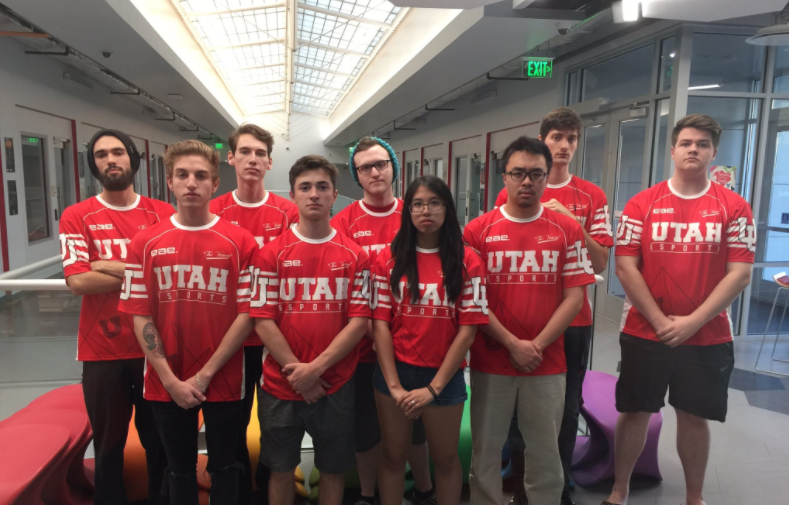The University of Utah’s eSports Overwatch team is off to a good start in their inaugural season. They added two victories this Thursday against UNLV and the University of British Columbia, bringing their record to 6-0 in the Tespa Collegiate Overwatch Series.
“I’m quite proud that our team has gotten this 6-0 record because people expected to lose against San Jose State and they expected us to lose against UBC. We’re vastly improving,” said the team’s assistant coach Evelynn Le.
The Utah squad is ranked first out of fifty teams in the tournament’s western region and are one of only two schools in the region who are still undefeated, the other team being the University of California, Irvine.
During Wednesday night’s best-of-three match against UNLV, the team was able to win the first game easily, taking the Oasis map 2-0. The team utilized the popular “Pharmercy combo” (pairing a Pharah with a Mercy) to great effect as Zachary Bastiani AKA “Flameturtle” was able to get three crucial kills as Pharah to capture the objective from the opposing team. The team never looked back as they controlled the objective for the rest of round one and all of second round.
“You might not see Pharah in the pro meta but we’re still collegiate. Pharah isn’t very good in pro play because there’s better team coordination and better hit-scan players so we’re pretty much abusing the fact that there aren’t a lot of great hit-scans at the collegiate level,” said Le.
UNLV played much better in the second game on King’s Row, a hybrid map where teams must first capture an objective point and then escort a payload.
The Utah squad started on offense and things were looking promising as Jamie Duchaine AKA “DaddyJay” was able to get multiple picks on the UNLV’s Mercy player but Utah was unable to capitalize on the advantage quickly enough, allowing the Mercy enough time to return back to the action and use her ultimate ability to resurrect her fallen teammates.
In the end, Utah was only able to capture one third of the initial objective point before their time ran out, meaning that on defense they would have to stop UNLV from making any progress on the objective point.
The defensive half went of the game went even worse for Utah than the offensive half did, as they were wiped out by UNLV in the very first team fight, allowing UNLV to win the game in under one minute, tying the match at one game apiece.
Le said that one thing the team could have done better on the map was to be more patient, especially with the enemy’s Reinhardt. “One of the things they could have done is just shoot the shield and then what’s the shield is down, you engage as a team,” she said.
The final game of the match took place on Hanamura, a map where each team has a chance to capture two objective points.
Utah captured the first point with ease as they wiped out UNLV’s team in just 47 seconds, leaving them with plenty of time to capture the second point.
On the second point, which favors the defense because it’s much closer to their spawn point, the Utah offense was able to grind out a long fight in which both teams had time for players to die, respawn, then join the battle again. In the end, Utah was able to make just enough plays to win the fight and capture the second point with over five minutes of time remaining.
As the teams switched sides, all Utah had to do to win the match was stop UNLV from taking both points.
Like Utah, UNLV’s offense was able to quickly take the first point. However, they struggled for a long time to take the second point. However, with about a minute left on their timer, UNLV entered a team fight with four of their characters having charged up their ultimate ability while Utah only had one character with their ultimate ready. UNLV took advantage as they were able to use a Transcendance, Earth Shatter, Valkyrie, and Attack Visor in order to knock Utah off the objective and capture it with about 30 seconds left.
Because both teams were able to capture both points on offense, Utah and UNLV were both allowed an additional turn on offense and defense to settle the match – an Overwatch variation of overtime. However, because Utah was able to capture the two points much more quickly, they were allotted much more time to work with.
Once again, both teams were able to capture the first point on offense, though because of the time difference, Utah had over four minutes to take the second point while UNLV only had 25 seconds. Utah’s defense stopped them from making any progress on the point and then their offense was able to take the point on their first attempt to win the game as well as the match.
As the team moves forward, Le said she wants to be less predictable in their lineup and strategy. “Right now we’re running the same [team] compositions. Anyone that watches who we scrim, anyone who asks who we scrim is going to know who we’re going to be playing. I want to start hitting people with the curveball. Our team has such large hero pools, just because we haven’t practiced something doesn’t mean that we don’t know how to do it,” she said.
The Utah Overwatch team continues their play in the Tespa tournament this week as they play two more regional matches on Wednesday evening.


